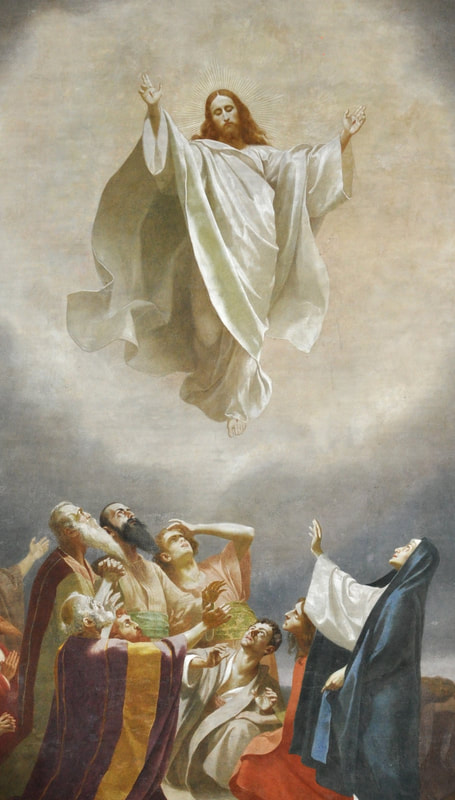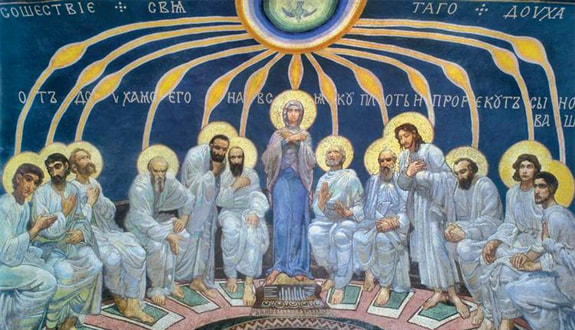The time for Christ's departure had come...
and although the separation from their Master was a
painful prospect for the confused disciples,
nevertheless they were to
discover an inner strength
and receive extraordinary comfort
that was not available to them
during Christ's lifetime on earth.
As faith begins to fail so fear starts to overtake the soul, and the prospect of life without Jesus plummeted His disciples into utter despair.
And in the confusion of the hour,
the faith of His loyal followers was severely tested.
But the Lord understood the deep depression that
His faithful disciples were going through,
and so He gave them mighty words of comfort and encouragement.
He explained that... up until now... HE had been with them;
to lead and to guide,
to comfort and teach,
to exhort and to correct.
But the time was at hand when Jesus was to leave them
and God would send the Holy Spirit to take His place.
A time was coming
when the Spirit of Christ was to
indwell the heart of all who
trusted Him for salvation.
Christ reassured His fearful disciples that the
Holy Spirit of God was coming very soon -
to reside in their hearts.
He was to show them undisclosed future things
through His gentle promptings
and the written Word.
He was to be another Christ-like Comforter Who would guide their hearts and minds into the way of truth -
so that by grace through faith,
they would have the mind of Christ!
And this work of the Spirit has continued for all believers ever since!
The Holy Spirit of truth will guide us
into all truth.
He is our personal Advisor
Who will teach and train,
exhort and encourage,
comfort and protect,
Seal and secure each individual saint
The supernatural work of the Spirit in all believers
is taking place now in a way
that never happened in ages past
The Spirit of God comes to permanently indwell every believer.
He seals each one with the protective seal of God, unto the day of redemption - when
faith will blossom into sight
and we will be with the Lord forever.
The Spirit works in the life of all believers in a brand new way - for He takes the things of Christ and discloses them to His redeemed people.
But for the one that has trusted Christ for the forgiveness of their sins and who has been covered in His own righteousness,
the promises are overwhelmingly wonderful -
He will glorify the Lord Jesus
in a way that
the world cannot understand
and He will take the things that the Father has
entrusted to Christ -
and disclose them to us!
Jesus is the Revelation of the Father
And all that is His, is to be revealed to us
by the indwelling Holy Spirit of God -
Who will guide us into all truth and lead us in the path of righteousness.
Peter’s sermon in Acts 2 is critically important since it demonstrates how the apostles interpreted the life, death and resurrection of Jesus, including the Ascension. Peter uses the Old Testament in this sermon and cites texts which were fulfilled in the events of Jesus’ life, but also in the events of Pentecost.
Peter first explains the significance of the Holy Spirit (2:14-21). Beginning with a prophecy from Joel 2:28-32, Peter states that the presence of the Spirit in the apostles at that moment is what Joel predicted.
In short, it is proof that the New Covenant has begun! Several other texts from the Hebrew Bible indicate that
the Spirit of God would fall upon his people
when the New Age begins
(Isa 32:14-15, 44:3; Ezek 11:19, 37:14).
Second, Peter explains that Jesus of Nazareth fulfilled the purpose of God in his death and was vindicated by God in his resurrection and ascension (2:22-35). The life of Jesus is summarized simply by stating that Jesus was from Nazareth and he was confirmed by God through many miracles. Since this is a summary of the actual sermon, it is entirely possible
Peter illustrated this point with his personal experience and witness.
Remember that the main theme of chapter one was that
the twelve were to be witnesses of these events!
There are several words used to describe the miracles
(signs and wonders).
Signs is the most significant, since σημειον (semeion)
typically refers to a miracle done to prove some sort of point,
to make some sort of revelation.
Peter states that God did the miracles through Jesus, not that Jesus himself did the miracles. He adds “as you yourselves know,” indicating that at least some of the crowd were witnesses to the miracles of Jesus. It is equally likely that the crucifixion of Jesus by the
Romans as a rebel was well known by the crowds in Jerusalem.
But Jesus is not dead...
God raised him from the dead in fulfillment of prophecy. Peter goes about proving the resurrection quite a bit differently than we do today. He does not mention the empty tomb or challenge the Pharisees to produce a body to prove that Jesus was really dead.
Rather than pursue modern logical arguments,
he turns to the Psalms and shows that David does not exhaust the meaning of the text.
Since the messiah is to be a new David, the
psalms Peter cites are turning into prophecies of Jesus’ resurrection.
Peter is clearly saying that the
messianic age has in -some way- already begun.
The Spirit has been poured out
on those who believe that Jesus is the Messiah.
The dead have already been raised.
Miracles are in fact happening.
Remember that the crowd assembled to hear this sermon are religiously observant Jews who are spending time in the Temple during a religious feast.
Peter is claiming that the age anticipated in
Isaiah, Jeremiah, Ezekiel and the Twelve
is beginning at that moment!
If this is on the right track,
what might a religiously observant and biblical educated Jew
in the first century have expected,
if the messianic age was beginning?
I suspect the crowd had a more than a few people with rather fervent messianic hopes.
They might have expected Israel to be re-gathered from the nations to Mount Zion to worship the Lord.
It is not a surprise, then,
to find that Jews from all over the world who believe in
Jesus as Messiah
settle in Jerusalem
to prepare themselves for his soon return.
In John 13 Jesus begins teaching His faithful disciples in what has come to be known as His “Upper Room Discourse.” In that great discourse, Jesus tells them that the Holy Spirit would guide them into all the truth (John 16:13). Many wonder whether this is something that applies to us as well or simply to the disciples. In the context, Jesus helps us understand the specificity of His promise that the Holy Spirit will “guide you into all truth” (John 16:13, NKJV).
First, it is worth noting that some English translations say “all truth,” the Greek New Testament actually includes the definite article, so a more precise way to translate what Jesus said is that the Holy Spirit would guide them into all the truth. There is a specific truth to which He is referring, and the Holy Spirit would guide them into that.
Specifically, the Spirit would reveal what the Son and the Father would have Him disclose (John 16:13–15)--things about Jesus (John 16:14).
Jesus had already told the disciples that He would send the Holy Spirit—the Helper—who would teach them and bring to their remembrance all that Jesus had said to them (John 14:26).
Peter said that God moved the writers of Scripture,
and they spoke from God (2 Peter 1:21).
When Matthew wrote his gospel, for example,
Matthew didn’t need to borrow from anyone;
he was in the room when Jesus said that the Holy Spirit would guide them into all truth.
It seems that Mark, who served alongside Peter for some time,
wrote down Peter’s account. Luke researched reliable sources
(presumably including the disciples)
as he wrote his account of Jesus’ ministry (Luke 1:1–4).
John, another eyewitness, wrote his own gospel,
stating that what he had written provided sufficient information for people
to believe in Jesus and have
Life in His Name
(John 20:30–31).
Before the disciples would begin their ministry, they were to wait in Jerusalem for the promised Holy Spirit
(Acts 1:4).
After the Holy Spirit came, the disciples were equipped for their work, and we see them
proclaiming powerfully the gospel of Jesus Christ
(e.g., Peter in Acts 2—4).
The Holy Spirit had indeed guided them into the truth
(John 16:13)
and brought to their remembrance what
Jesus had said to them
(John 14:26).
While we certainly benefit from that work of the Holy Spirit—as we have the writings of these men whom the Holy Spirit guided into the truth—it is clear from other contexts that
this is not how the Holy Spirit works with all believers.
Guiding into the truth was simply a purpose
for which He was sent to empower and equip the disciples.
Paul tells Timothy, for example, that Timothy should be diligent as a workman, accurately handling the word of truth
(2 Timothy 2:15).
Timothy would have to work to understand
what had been written, and he would
have to be diligent to hold true and pass along
the things he had heard from Paul
(2 Timothy 2:2).
Similarly, we are told that all Scripture is from God’s mouth and is profitable for believers’ growth and equipping
(2 Timothy 3:16–17).
We are thankful for and benefit greatly from the Holy Spirit guiding the apostles into all the truth, and we recognize that, because of the Spirit’s work through the disciples, we have His record: the Bible. We should be diligent in studying the Bible to know the Lord better.
Beginning in Joel 2:28,
the prophet transitions to a description of events in the distant future (from his vantage point). Verse 28 says, “And it shall come to pass afterward, that I will pour out my Spirit on all flesh.” What did he mean? Has this been fulfilled?
In Acts 2:15-17
Peter is preaching on the Day of Pentecost: “For these people are not drunk, as you suppose, since it is only the third hour of the day. But this is what was uttered through the prophet Joel:
‘And in the last days it shall be, God declares,
that I will pour out my Spirit on all flesh.’”
In this sermon,
Peter connects Joel’s prophecy with the Holy Spirit’s coming and the commencement of the church.
Not every detail of Joel’s prophecy is yet fulfilled,
but the “pouring out of the Spirit” began on the Day of Pentecost.
From that time,
the Holy Spirit indwells all those who come to faith
in Jesus Christ.
This event marked a notable difference in the Spirit’s role from Old Testament times. The Spirit had previously only empowered certain individuals and sometimes only for a particular period of time. On the Day of Pentecost, the 120 followers of Jesus in the Upper Room not only experienced the Holy Spirit’s power but His abiding presence (cf. John 14:16). Three thousand people believed and were baptized that day. These converts all received the Holy Spirit into their lives that same day
(Acts 2:38).
One of the surprising outcomes of Joel’s prophecy was that even non-Jews were filled with the Spirit. In Acts 10:45 we read, “The believers from among the circumcised . . . were amazed, because the gift of the Holy Spirit was poured out even on the Gentiles.” God was lavishing His Spirit on everyone who believed in Jesus, regardless of their culture, nationality, or ethnicity. “All people,” as Joel had said, were offered this gift.
The Holy Spirit will play an active role in end-time events,
bringing to pass the other aspects of Joel’s prophecies in
Joel chapters 2 and 3
(Revelation 1:4, 10; 2:7, 11, 17, 29; 3:1, 6, 13, 22; 4:2, 5, 6; 14:13; 17:3; 21:10; 22:17).
However, the initial fulfillment of this prophecy
has already begun, as noted by the apostle Peter,
allowing all who follow Christ today to
experience the blessing of the Holy Spirit living within them
and empowering them for Christian service.




 RSS Feed
RSS Feed
























































